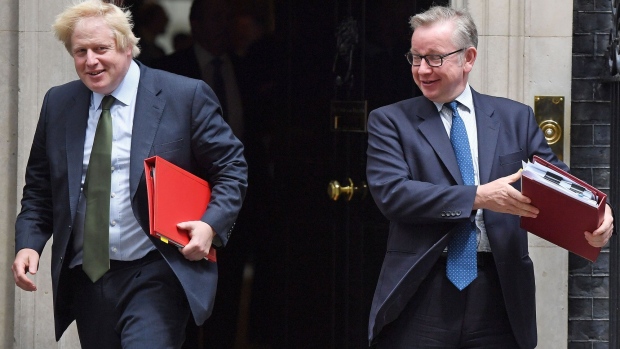Dec 8, 2020
Boris Johnson Needs Two Brexit Deals, Not One
, Bloomberg News

(Bloomberg Opinion) -- After two phone conversations in as many days, Boris Johnson and European Commission President Ursula von der Leyen agreed to meet in person in a bid to keep the stalled Brexit trade talks from failing entirely. That rescue mission will take some doing.
Working against them is the absence of a clear deadline; the significant differences between the sides on the three key issues of fisheries, rules for fair competition and how a deal would be policed; and the fact that Johnson struggles to make decisions where binary outcomes are involved. This is a prime minister who famously described himself as “pro having my cake and pro eating it.”
What makes a devilishly complicated situation more so is that there are really two parallel negotiations going on. Apart from the trade talks themselves, there are discussions on the implementation of the 2019 treaty that secured Brexit: the Withdrawal Agreement, and the accompanying Irish Protocol that ensured no return of a hard border with Northern Ireland. Those talks are being led by Michael Gove, Johnson’s cabinet colleague, and the European Union’s Maros Sefcovic, who met in Brussels Monday.
The two negotiations are separate but intertwined. The failure of Gove’s talks (where both sides have made positive noises so far) would mean Johnson is likely to press ahead with U.K. legislation that breaches the treaty, which would mean there can be no trade deal. The failure of a trade deal, meanwhile, would strengthen demands from within Johnson’s Conservative Party to carry through with that treaty-breaking legislation. The consequences of this would be dire for Ireland, the U.K. and Europe.
All of this grew out of Johnson’s determination to have it both ways. Having signed the withdrawal deal last year (winning an election off the back of that success), the government quickly regretted how much sovereignty over Northern Ireland it had given away. It introduced the Internal Market Bill in September with a public declaration that the U.K. would be breaking international law in “limited and specific” ways to ignore the parts of the protocol that it doesn’t like.
The legislation has been criticized by U.S. President-elect Joe Biden, who’s concerned about undermining Northern Ireland’s Good Friday peace agreement, and five former U.K. prime ministers. The EU has threatened legal action and made clear it won’t agree any trade deal if the offending clauses aren’t removed.
The government insists the unilateral measures are merely an insurance policy in case the EU gets heavy handed in using its powers or the two sides can’t agree. But it has hung like sword of Damocles over the Brexit trade talks. The House of Lords gutted parts of the Bill, removing the clauses that breach the treaty with the EU. On Monday night, U.K. lawmakers voted to reinsert them.
Just before Johnson’s call with Von der Leyen Monday, the government issued a statement saying it would remove one clause and “deactivate” others that violated the Withdrawal Agreement provided the two sides could agree.
That won’t be easy, however, as the protocol is now a new sore point for Tory Brexiters. The new bill would let the U.K. unilaterally waive the requirement that companies moving goods from Northern Ireland into Great Britain fill out export declaration forms. The Bill also lets ministers reinterpret state aid rules where it impacts Northern Ireland.
And it’s not just one piece of legislation at issue. The U.K. Taxation Bill, due this week, would also breach the Withdrawal Agreement by reportedly giving Britain the power to define the criteria by which goods from the U.K. mainland to Northern Ireland are deemed not at risk of entering the EU (and so wouldn’t need to pay a tariff). In extending an olive branch Monday, Johnson’s government also said it will “keep under review” the contents of that bill.
It’s easy to understand why many Conservatives loathe these limits on British sovereignty. But what did they expect? Leaving the single market and customs union while also avoiding a border between Northern Ireland and Ireland means there has to be a border somewhere with the EU (in this case in the Irish Sea). It was always going to be costly and awkward. Even with a tariffs deal, there will be new trade barriers.
Retailer Marks & Spencer Group Plc warned recently that 15% of its food products may not be available in Northern Ireland from January. That’s because under the withdrawal treaty, Northern Ireland follows EU rules on food safety.
A trade deal that eliminates tariffs on goods would do away with much of this tension and restore some good will. However, the government’s deactivation pledge on the Bill does not, in itself, unblock the broader trade talks. It’s a promise Johnson may struggle to keep, and Brussels is fully aware of that.
Even if he reaches a trade deal, there will be sustained pressure on him from his party to change the terms of the withdrawal deal. The EU may have most of the leverage in these negotiations, but it also has good reason to be flexible in how it applies the protocol, for both Northern Ireland’s and Ireland’s sake.
If the Gove-Sefcovic talks fail, that will make a trade deal impossible. But the cost wouldn’t just be economic; such a failure would put U.K.-EU relations on a whole different footing, hurting any future cooperation. Anything that undermines Northern Ireland’s peace would have serious consequences for Britain’s international standing, its relations with the U.S. and its own increasingly fragile union. Johnson and Brussels don’t just need one deal; they need two.
This column does not necessarily reflect the opinion of the editorial board or Bloomberg LP and its owners.
Therese Raphael is a columnist for Bloomberg Opinion. She was editorial page editor of the Wall Street Journal Europe.
©2020 Bloomberg L.P.






